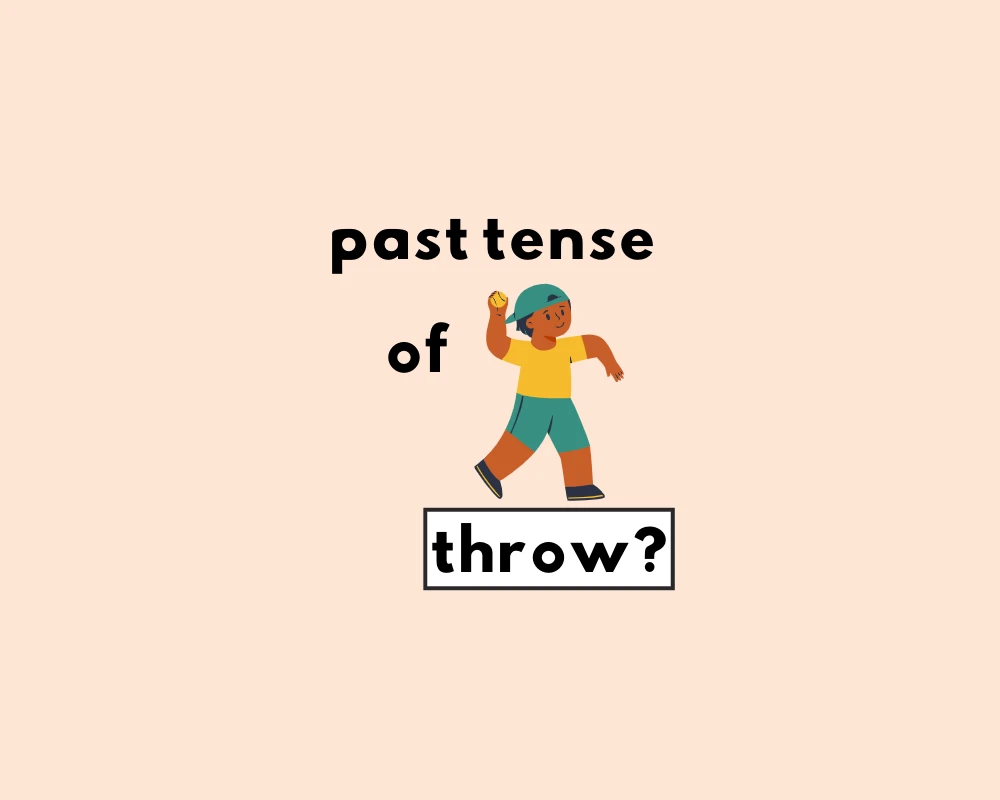
Contents
Toggle
What’s the past tense of “throw”?
The verb and action, to throw (present tense), describes the bodily movement of, “sending something from your hand through the air by moving your hand or arm quickly”, as stated by the online Oxford Learner’s Dictionary.
- Throw is an irregular verb (its past tense forms don’t end in “ed”).
- Threw is the simple past tense; thrown is the past participle form.
A couple additional points of clarification: threw sounds the same as through, but they’re are not the same:
Through is an adverb or a preposition that communicates entering from “one side and out of the other side of (an opening, channel, or location)”. Threw is the past tense of the verb throw, as already mentioned.
Verb tenses of “throw”
| present | past | future | |
| simple | I throw | I threw | I will throw |
| continuous | I am throwing | I was throwing | I will be throwing |
| perfect | I have thrown | I had thrown | I will have thrown |
| perfect continuous | I have been throwing | I had been throwing | I will have been throwing |
When to use threw or thrown
Which is the correct context to use the past tense threw vs the past participle thrown? Compare the sentences below that demonstrates both words in their correct contexts:
Past tense: She threw the ball up and caught it again.
Past participle: Everything was thrown into chaos.
Thrown, the participle form of the verb throw, is often required in more complex sentence structures, and uses a sentence object (also forming the passive voice). If the terms ‘passive voice‘ and ‘sentence object‘ are unfamiliar, it’s worthwhile taking the time to read up and learn about these terms (they’re relevant, and prevalent terms in English grammar).
Participles are easy to identify in sentences once you’ve learned both their regular and irregular forms, since they require a helper/auxiliary verb to pair with them to form the past perfect tense. We use the past perfect tense to clarify the order of events, or the succession in which things transpired leading up to the present.
“Throw” / “threw” / “thrown”, used in sentences
| Examples: throw, used in sentences |
| Don’t throw it to him; give it to him! The hotel is within a stone’s throw of the beach. It’s your throw. They’re throwing it over this way! |
| Examples: threw/thrown, used in sentences |
| He threw the ball into the bushes and the dog ran to fetch it. He threw the double doors open in a dramatic gesture. Three grenades were thrown into the corridor. Two petrol bombs had been thrown through the front window. |
Practice questions: forms of ‘throw’
| Select the correct verb form to complete the sentences. | Answers: |
|---|---|
| 1. Can you ___ me that towel? | a. throws b. throwing c. threw d. throw |
| 2. Practise ___ and catching. | a. throws b. throwing c. threw d. throw |
| 3. He ___ the keys casually down on the table. | a. throws b. throwing c. threw d. throw |
| 4. We were ___ into confusion by the news. | a. throws b. thrown c. threw d. throw |
| 5. A blanket was ___ over the bed. | a. throws b. throwing c. threw d. thrown |
| 6. Just ___ your bag down over there. | a. throws b. throwing c. threw d. throw |
| 7. Who ___ that rock? | a. throws b. throwing c. threw d. throw |
| 8. Everything ___ into chaos. | a. was thrown b. throwing c. threw d. throw |
| 9. They had a competition to see who could ___ the furthest. | a. throws b. throwing c. threw d. throw |
| 10. She ___ the ball up and caught it again. | a. throws b. throwing c. threw d. throw |
Answers
- d
- b
- c
- a
- b
- b
Synonyms of throw
- toss
- hurl
- fling/flung
- chuck
- lob
- pitch
Phrases with throw
| phrase | meaning |
|---|---|
| don’t throw out the baby with the bath water | Don’t get rid of something good in an attempt to remove what’s bad. |
| throw a monkey wrench into the works | To sabotage or frustrate a project or plans. |
| those who live in glass houses shouldn’t throw stones | Meaning don’t be a hypocrite. |
| I wouldn’t trust them as far as I could throw them | A way to say you don’t trust someone or think they’re trustworthy. |
| to be thrown off-balance or thrown a curve ball | To be caught off-guard or are unprepared to deal with something overwhelming. |
| a stone’s throw away | Meaning somewhere close in proximity. |
| to be thrown to the wolves | To be left to deal with something difficult on your own. |
| don’t have a pot to piss in or a window to throw it out of | Meaning you are poor or don’t have much. |
| to throw someone into the deep end | To prompt or force one to begin doing something very complex and/or unfamiliar, especially suddenly. |
| don’t throw good money after bad | Don’t waste money on bad decisions. |
| to throw in the towel/sponge | Meaning give up. |
| to throw caution to the wind | To abandon cautiousness in favour of being risky. |
Origin of the word/verb throw
From etymology online on throw (v.):
“To project, propel,” c. 1300, from Old English þrawan “to twist, turn, writhe, curl,” (past tense þreow, past participle þrawen), from Proto-Germanic *threw-.
Learn more about verbs
| Types of verbs & verb tenses | what’s the past tense of …? |
| forms of ‘to be’ | … seek? |
| auxiliary verbs | … teach? |
| present tense | … catch? |
| future tense | … buy? |
| past tense | … read? |
| perfect tense | … ring? |
| transitive vs. intransitive | … drive? |
| participles | … know? |
| irregular verbs | … lead? |
| modals | … win? |
Sources
- Wikipedia. 2023. “Indo-European ablaut.” Wikimedia Foundation. Last modified January 10, 2023. https://en.wikipedia.org/wiki/Indo-European_ablaut
- Harper, Douglas. “Etymology of throw.” Online Etymology Dictionary, https://www.etymonline.com/word/throw. Accessed 15 January, 2023.
- For Farlex Dictionary of Idioms:”throw caution to the wind(s).” Farlex Dictionary of Idioms. 2015. Farlex, Inc 18 Feb. 2024 https://idioms.thefreedictionary.com/throw+caution+to+the+wind(s)










